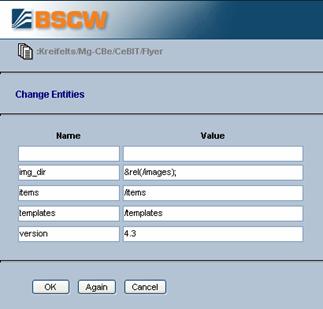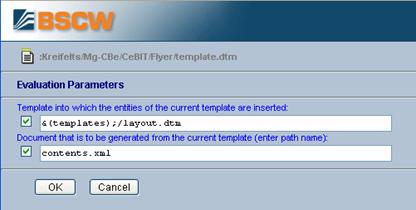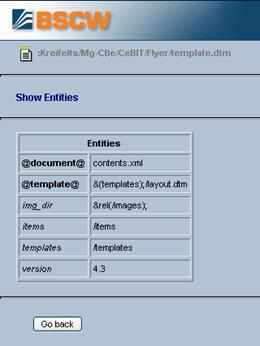Using the Document Generator
To start the Document Generator, you have to add a new document set by selecting in the top menu. You have to enter a name and an optional description as well as a character set in which the entities of the new document set will be coded. You may change this character set again using
To define entities in the folder hierarchy of a document set, use in the top menu of the document set or its subfolders. You may specify the name and the value of a new entity or change an existing one. If the name field remains empty, the entity will be removed.

Figure 21: Defining entities
After you have generated the templates on your local
computer and have them uploaded to the document set (don’t forget to enter
‘Document Template’ (text/x-bscw-template) as MIME type), you may
use  to set the evaluation parameters of the
templates. This lets you specify a template, into which the entities of the
present template are to be inserted, and the name of a document which is to be
generated from the present template. Internally the evaluation parameters are
treated as entities with the name
to set the evaluation parameters of the
templates. This lets you specify a template, into which the entities of the
present template are to be inserted, and the name of a document which is to be
generated from the present template. Internally the evaluation parameters are
treated as entities with the name @template@ and
@document@, respectively.

Figure 22: Defining the evaluation parameters
To view all entities of the document set, of one of its
folders or of a template, use
or  . If an entity appears in italics it
is inherited via the folder hierarchy.
. If an entity appears in italics it
is inherited via the folder hierarchy.

Figure 23: Displaying entities
The evaluation process may be started for the whole
document set, for one of its folders, a set of selected templates or single
templates using
,
or  ,
respectively. Documents that have already been generated in prior evaluations
will be replaced.
,
respectively. Documents that have already been generated in prior evaluations
will be replaced.
For a backup of a document set you may save all entities with . This generates a file which you may save on your local computer. The file has the following syntax where ‘object path’ designates the path name of the object (folder, template) whose entities are stored within the document set.
'<object-path>'
= {
'<name_of_entity>' = '<value-of-entity>'
...
}
...
With  you may import such entity backup files.
you may import such entity backup files.